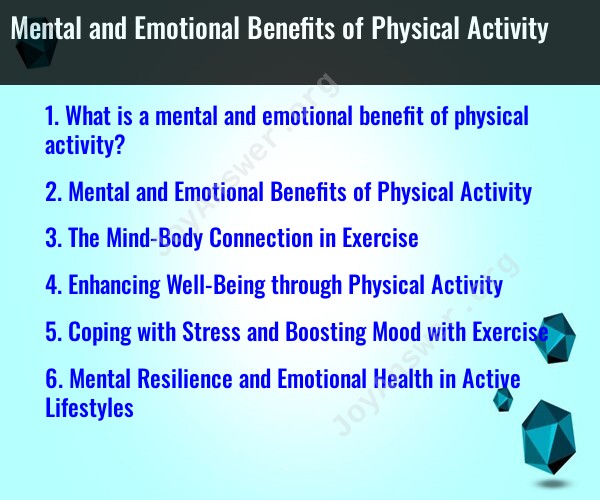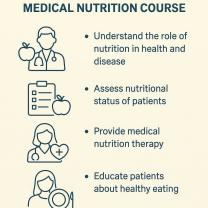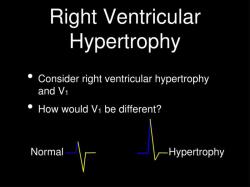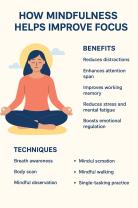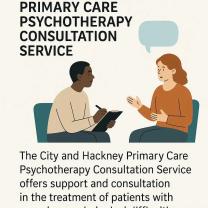What is a mental and emotional benefit of physical activity?
One significant mental and emotional benefit of physical activity is its ability to improve mood and reduce feelings of stress, anxiety, and depression. Engaging in regular physical exercise can positively impact mental health in several ways:
Release of Endorphins: Physical activity triggers the release of endorphins, neurotransmitters in the brain that act as natural mood elevators. Endorphins can create feelings of happiness and euphoria, reducing stress and anxiety.
Reduction of Stress: Exercise helps reduce the body's stress hormones, such as cortisol and adrenaline. Physical activity can act as a natural stress reliever, promoting relaxation and reducing tension.
Improvement in Sleep Quality: Regular exercise is linked to improved sleep patterns and quality. Better sleep contributes to overall mental well-being and helps regulate mood.
Enhanced Cognitive Function: Physical activity has been associated with improved cognitive function and a reduction in cognitive decline. It can enhance memory, attention, and overall brain health, contributing to better mental clarity and focus.
Boost in Self-Esteem: Regular physical activity, especially when progress is seen, can boost self-esteem and self-confidence. Achieving fitness goals or simply engaging in regular exercise can lead to a sense of accomplishment and improved self-perception.
Distraction and Relaxation: Exercise can serve as a distraction from daily stressors, providing an opportunity to unwind and clear the mind. Focusing on physical activity can act as a form of mindfulness, promoting relaxation and reducing rumination.
Social Interaction: Participating in group physical activities or sports can provide opportunities for social interaction and support, which can positively impact mental health by reducing feelings of isolation or loneliness.
These mental and emotional benefits highlight the positive impact that regular physical activity can have on overall well-being. Incorporating exercise into a daily routine, even in moderate amounts, can significantly contribute to better mental health and a more positive outlook on life.
Move Your Body, Move Your Mind: The Mental and Emotional Power of Exercise
Physical activity isn't just about sculpted physiques and toned muscles; it's a potent potion for your mental and emotional well-being. Let's dive into the fascinating connection between movement and mood:
Mental and Emotional Benefits of Physical Activity:
- Stress reduction: Exercise releases endorphins, our natural feel-good chemicals, melting away stress hormones like cortisol.
- Improved mood: Physical activity boosts serotonin and dopamine, neurotransmitters linked to happiness and motivation, leaving you feeling more positive and energetic.
- Enhanced sleep quality: Regular exercise tires your body in a healthy way, promoting deeper, more restful sleep, crucial for mental clarity and emotional resilience.
- Increased self-esteem: Reaching fitness goals, overcoming challenges, and feeling stronger builds confidence and self-worth.
- Reduced anxiety: Exercise gives you a sense of control, reduces negative thoughts, and helps manage anxiety symptoms.
- Sharper memory and cognitive function: Physical activity stimulates the growth of brain cells and improves blood flow to the brain, boosting memory, focus, and overall cognitive function.
The Mind-Body Connection in Exercise:
Our physical and mental states are intricately linked. When we move our bodies, we send positive signals to our brains, triggering a cascade of beneficial neurochemical changes. Exercise activates stress-reduction pathways, calms the nervous system, and promotes emotional regulation.
Enhancing Well-Being through Physical Activity:
The beauty of exercise lies in its accessibility. It doesn't matter if you're a gym rat or a weekend warrior; any movement counts. Find activities you enjoy, whether it's dancing, swimming, team sports, or even brisk walking. Consistency is key; aim for at least 150 minutes of moderate-intensity exercise or 75 minutes of vigorous-intensity exercise per week.
Coping with Stress and Boosting Mood with Exercise:
Feeling overwhelmed? Exercise is your natural stress reliever. A quick run, a yoga session, or even some jumping jacks can release tension, clear your head, and leave you feeling calmer and more centered. Feeling down? Exercise is your mood booster. The endorphin rush and feel-good chemicals released during physical activity can elevate your mood, leaving you feeling more positive and optimistic.
Mental Resilience and Emotional Health in Active Lifestyles:
Regular exercise builds mental resilience, the ability to bounce back from challenges and setbacks. It strengthens your emotional coping mechanisms, making you better equipped to handle stress, anxiety, and difficult emotions. An active lifestyle fosters a sense of well-being and emotional stability, leading to a more fulfilling and balanced life.
Remember, exercise is not a punishment; it's a celebration of your body's amazing potential. So, move your body, move your mind, and unlock the incredible mental and emotional benefits that physical activity has to offer!
